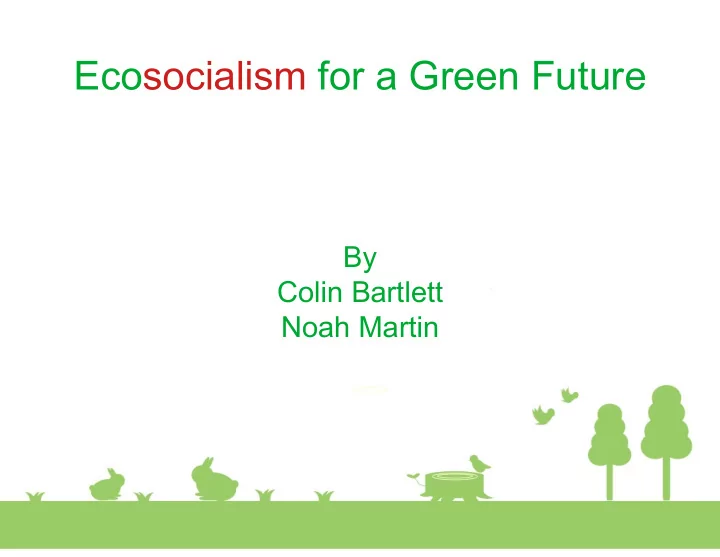

Ecosocialism for a Green Future By Colin Bartlett Noah Martin
Ecological Economics “The Green Party seeks to build an alternative economic system based on ecology and decentralization of power that rejects both the capitalist system that maintains private ownership over almost all production as well as the state-socialist system that assumes control over industries without democratic, local decision making. We believe the old models of capitalism (private ownership of production) and state socialism (state ownership of production) are not ecologically sound, socially just, or democratic and that both contain built-in structures that advance injustices. Instead we will build an economy based on large-scale green public works, municipalization, and workplace and community democracy. Some call this decentralized system “ecological socialism,” “communalism,” or the “cooperative commonwealth,” but whatever the terminology, we believe it will help end labor exploitation, environmental exploitation, and racial, gender, and wealth inequality and bring about economic and social justice due to the positive effects of democratic decision making. Production is best for people and planet when democratically owned and operated by those who do the work and those most affected by production decisions. This model of worker and community empowerment will ensure that decisions that greatly affect our lives are made in the interests of our communities, not at the whim of centralized power structures of state administrators or of capitalist CEOs and distant boards of directors. Small, democratically run enterprises, when embedded in and accountable to our communities, will make more ecologically sound decisions in materials sourcing, waste disposal, recycling, reuse, and more. Democratic, diverse ownership of production would decentralize power in the workplace, which would in turn decentralize economic power more broadly.”
What DON’T We Want? The Green Party seeks to build an alternative economic system based on ecology and decentralization of power. We reject the capitalist system that maintains private ownership over almost all production. We reject state-socialist systems that assume control over industries without democratic, local decision making.
Ecosocialism: The Green Alternative ”Instead we will build an economy based on large-scale green public works, municipalization, and workplace and community democracy...Production is best for people and planet when democratically owned and operated by those who do the work and those most affected by production decisions.” Greens advocate for a mixed economy of publicly and cooperatively owned productive forces: Resources should be distributed as broadly and equitably as possible. Projects should be managed at the most local level that is practical. We do not advocate for an economic system based on private property. The long-term goal is to end class conflict by ending classes.
Grassroots Democracy Under capitalism, democratic political institutions are undermined by the undemocratic economy. Under state socialism, democratic economic institutions are undermined by the undemocratic political institutions. Under ecosocialism, democratic economic institutions are mutually reinforced by democratic political institutions.
Social Justice Capitalism’s constant growth and dependence on inequality relies on colonialism and imperialism, and reinforces patriarchy. State socialism’s focus on centralized power and nationalism leads to chauvinistic domestic and foreign policy. Ecosocialism is non-expansionary and internationalist in practice, and its focus on direct community control ensures communities are leaders in their own liberation. The goal of socialism is to right social injustice, and the Greens’ inclusive approach is uniquely able to ensure it actually does that.
Nonviolence What we recognize as nonviolent may be different depending on our paradigm. Capitalism is predicated on the use of violence to acquire and secure resources and power. A Capitalist paradigm tends to privilege property, considers all property damage regardless of circumstances to be violence, and often does not recognize social violence as violence at all. State socialism has historically been reliant on organizing soldiers and hierarchical cadre party structures. A State Socialist paradigm tends to downplay violence done by centralized power structures against organic communities and dissenting minorities in the name of a broader national project. Ecosocialism depends on solidarity between diverse communities based on shared ecological principles. An Ecosocialist paradigm supports community defense from social and ecological violence through grassroots mass organizing across artificial borders.
Ecological Wisdom Capitalism is predicated on endless growth and consumption. The world cannot sustain a global capitalist system in perpetuity. Period. Under State Socialism, economic planning has also been focused on maximizing production and resource exploitation to compete with capitalism. Ecosocialism is predicated on production that recognizes our ecological limits, which can only happen through a decentrally planned economy. It disrupts capitalism through resilience and solidarity rather than production and war.
Green Socialism Greens think about the economy as a human piece of the ecology, a key analysis which is absent in other US-based socialist organizations. This is why we think it is so important for Greens to be socialists and socialists to be Greens!
ANY QUESTIONS? Abdullah Ocalan, Naomi Klein, This Democratic Changes Everything Confederalism Ian Angus, A Redder Andrej Grubačić and Shade of Green Straughton Lynd, Wobblies and Joel Kovel, The Enemy of Zapatistas Nature Andreas Malm, Fossil Capital Kali Akuno & Ajamu Nagwaya, Jackson Rising Murray Bookchin, The Ecology of Freedom
Recommend
More recommend